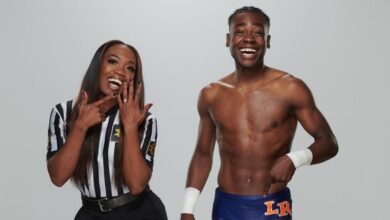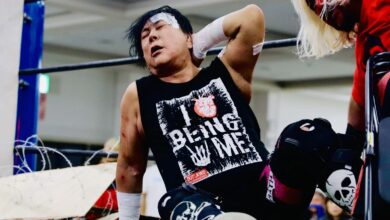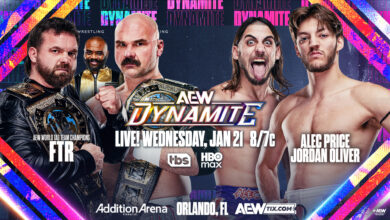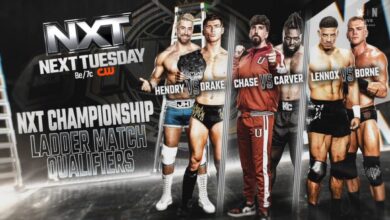Kaitlyn Talks About Struggling With Body Dysmorphia, Her WWE Departure, And Finding Her True Self
Kaitlyn gets real about her WWE departure.
Kaitlyn, Celeste Bonin, was one of the top WWE Divas during what would become a transition period from the Divas Championship era to the modern Women’s Evolution era.
Kaitlyn was a WWE Divas Champion and even lost the title to AJ Lee who would go on to hold it for a historic amount of time. However, when she left WWE, her journey to self-discovery was just beginning. now, she has spoken about that journey to Renee Paquette on The Sessions Podcast and she is very real about all of our struggles.
“My time in WWE, it would be easy to say it fucked me up and I thought that for a long time and that’s why I didn’t do anything in wrestling for a really long time, until the [2018 Mae Young Classic]. That was such a big deal to me because I literally didn’t know how to process it. Any time that I’d do an appearance or a signing or something or talk about wrestling, I’d have these feelings that I didn’t know how to process and I didn’t know how to not have them, essentially,” she explained. “Everything I looked at in wrestling, the painful shit and the things I went through and was struggling with during my time there. Also, the really profoundly beautiful things, all the opportunities, the travel, the connections, the love available to me from fans and my peers, and the deep connections that I made all of it showed me and reflected to me things that already existed in me, pain that already existed in me.”
Continuing on, she spoke about the day that she asked for her release and the feeling of negative self-image that led to her departure.
“I left wrestling because I thought I was just gonna get fired,” she said. “I felt less and less relevant. I had so much shame I had gained all this weight, and like my body was just giving me every signal that I was not okay, emotionally, mentally, I had so much hatred for myself, I had so much resentment for myself and like that projected outwards towards others. I was in self-destruct mode, so I just asked for my release on a day that was a really shitty day.
“I was so disassociated from so much of that day,” she continued. “Because it was so painful because I didn’t understand why I was doing these things. I just was like, ‘I don’t know what to do.’ For a long time, I hated the way I left because like I ripped myself out of like really the only love and support I had really in my life. But I didn’t know how to receive any of it. Like I was isolating myself. So I’m like, ‘Okay, well, maybe this is time for me to leave.’ I had gotten engaged really fast. I felt like I just needed to go on a hiatus and just figure my shit out. I left and I got a couple of months’ severance and I didn’t really have a plan on what I was going to do. I literally felt like I don’t have anything to give to share. I don’t know what I’m going to do. I don’t know what my career is — I felt so lost.”
Celeste then spoke about how she realized wrestling was just replacing Fitness competitions in her mind and discussed how she started having body dysmorphia issues following her first competitions.
“I can see this now to me it [the business] was just replacing wrestling, and wrestling was replacing fitness and competing. So like my only relevance, I felt growing up like in my teen years, especially, I started to find my identity in being really muscular and strong. So I started working out a lot and I competed as soon as I got out of high school and that became my identity. I was like, this is the way that I’m going to get love and respect and be something in the world through this. This is the vessel and so when I started doing that, I had some success. Then immediately after the first couple of shows I did I started having like really fucked up body dysmorphia and didn’t I didn’t understand nutrition, I didn’t understand how to take care of myself.
“I think it’s why I love connecting to fans so much,” she said. “Now when I do like signings and stuff, because I’m like, ‘whatever you’re going through right now,’ because like, a lot of times people come up and they’re so nervous, and they’re just like, like a wreck. I’m like, just so you know, ‘Whatever you’re feeling it’s okay, when I was on TV, I felt like this every day.’ So, we’re all the same. It’s so cool. Because like that really gives people this ability to be like, ‘oh,’ so, wrestling became my new vessel.”
Now, she is all in on coaching classes via her Project This Is Me, which she founded with her partner, Grant Dziak. You can find out more by following her on social media.
If you or anyone you know is struggling with body dysmorphia issues, you can reach out to the NEDA Helpline, and talk to strange volunteers who can listen, and offer support, and resources.
Here is also a list of resources from the Body Dysmorphic Disorder Foundation
Should you use any portion of the quotes above, transcription credit should go to Fightful with a H/T linking back to this article.



